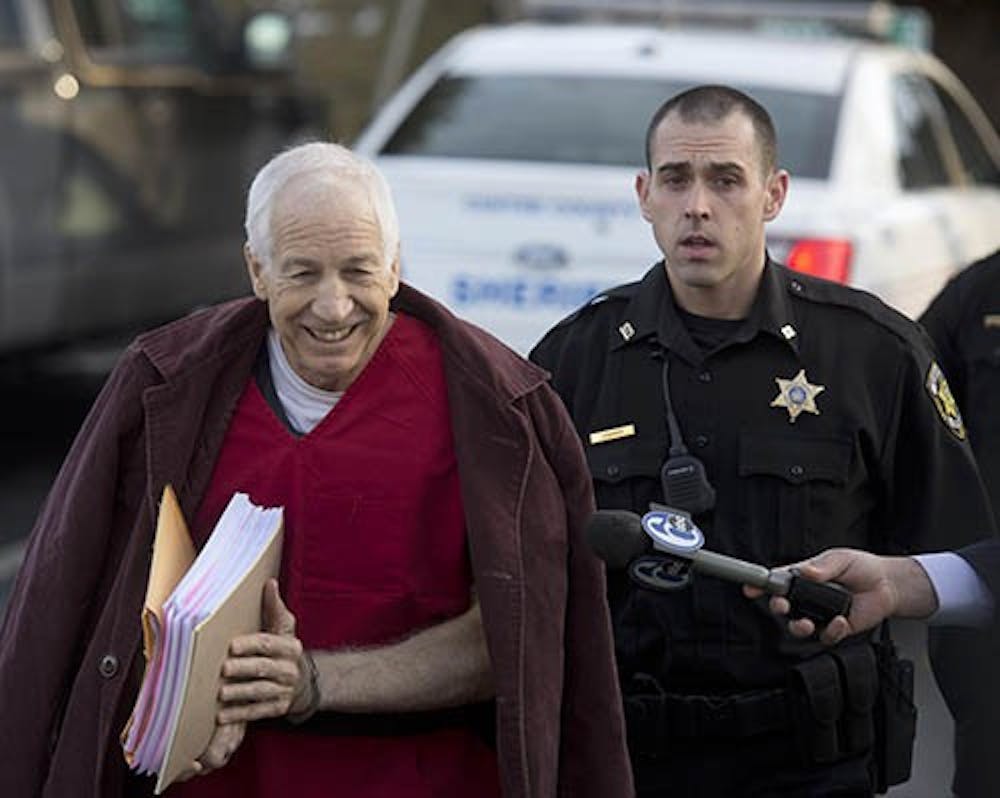HARRISBURG, Pa. — Former Penn State assistant football coach Jerry Sandusky’s “major claims” as he appeals a child sexual abuse conviction include the many years that went by before accusers notified authorities, according to a pair of defense filings Monday.
Attorney Norris Gelman listed the failure to report — specifically, the judge’s refusal to instruct jurors on the issue — as a critical element of Sandusky’s effort to overturn the 45-count conviction.
Gelman also argued that the defense lawyers lacked sufficient time to prepare for the three-week trial last summer.
He revisited arguments previously rejected by the judge who presided over the trial, John Cleland. The new filings set the stage for formal appeals before Superior Court.
Sandusky was convicted of molesting 10 boys over a period of several years in a case that brought down Hall of Fame coach Joe Paterno and led to sanctions against Penn State’s storied football program. Sandusky, 69, is serving 30 to 60 years at a state prison. He acknowledges showering with boys but insists he didn’t molest any of them.
Penn State’s costs from the massive fallout from the scandal topped $41 million as of the end of December, the university posted Monday on a website. The latest disclosure offered more itemization for certain costs, including the $8.1 million bill for the internal investigation led by former FBI director Louis Freeh.
Gelman, in the court filings, listed the reporting delays by the eight young men who testified against Sandusky. He said only one of them reported allegations of abuse promptly, while the others waited between four and 14 years.
“Reversible error was committed when the trial court refused the defense request to give jury instructions on the failure of the alleged victims to make a prompt complaint to authorities based on its view of ‘the research’ which led the court to believe that in the area of child sexual abuse such an instruction was not ‘an accurate indicia of honesty and may be misleading,’” Gelman wrote.
The state attorney general’s office, which prosecuted Sandusky, offered no immediate comment on the Sandusky filings, one made to the trial judge and the other to Superior Court.
Attorney Jeff Anderson, who represents two people with claims related to Sandusky, said the prompt complaint issue was unlikely to result in a new trial.
“I think it’s a shallow and predictably made legal argument that has to be made, but it will effectively go nowhere,” said Anderson, whose clients are not among the eight who testified at trial.
Gelman also said the trial judge should have given Sandusky’s attorneys more time to prepare for trial.
“No attorney should be forced to defend without basic preparation and time to integrate discovery material into a defense,” Gelman wrote.
Other grounds include a prosecutor’s reference during closing argument to Sandusky giving a television interview shortly after he was arrested.
Gelman said in an interview on Monday that the message to jurors was that Sandusky had spoken about the allegations on TV but not in court.
“That’s a body blow,” Gelman said. “You just don’t do that.”
His new filings also argued the trial judge erred by allowing hearsay testimony about a shower attack witnessed by a Penn State janitor. He said Monday that the next step is for the judge to either stand by his previous ruling or issue a supplemental ruling.
After that, he said, Sandusky will file his appeal to Superior Court.
Also, Monday, Penn State released a copy of an engagement letter with Freeh that outlined the scope and terms of his responsibilities. It was signed on Dec. 2, 2011, by Freeh, then-board chair Steve Garban and trustee Kenneth Frazier, who headed the trustees committee to which Freeh reported.
Some critics of the way school leadership have handled the scandal had asked for the release of the letter.
Freeh concluded that Paterno and three Penn State administrators acted to conceal allegations against Sandusky to protect the university’s image. The administrators have vehemently denied the findings, as has the family of Paterno, who died in January 2012.
Last month, a critique commissioned by Paterno’s family called Freeh’s findings inaccurate and unfounded.


